Search Engine Optimization (SEO) is all about ranking higher on search engine result pages (SERPs). However, what if your web pages are competing against each other instead of ranking higher collectively? This problem, known as keyword cannibalization, can silently damage your SEO efforts. Many website owners unknowingly create multiple pages targeting the same keywords, which confuses search engines and lowers rankings. This guide will help you understand keyword cannibalization, its negative impact on SEO, and how to fix it effectively.
What is Keyword Cannibalization in SEO?
Keyword cannibalization occurs when multiple pages from the same website compete for the same search query, causing confusion for search engines and reducing the ranking potential of each page. Instead of consolidating authority on one strong page, the traffic gets divided, making it harder to rank higher on search engine result pages (SERPs).
This issue often arises due to poor keyword strategy, unintentional duplication of content, or a lack of SEO planning. To resolve it, website owners should analyze their keyword strategy, consolidate similar content, and implement proper redirects or canonical tags to ensure the right pages receive the most visibility.

Why Does Keyword Cannibalization Happen?
Some common reasons why sites face keyword cannibalization include:
- Multiple Blog Posts on the Same Topic
- If you publish several blog posts targeting the same keyword, they compete with each other instead of ranking higher.
- Similar Product or Service Pages
- E-commerce websites often create different pages for similar products, unintentionally targeting the same keyword.
- Lack of a Proper SEO Strategy
- Without a proper keyword mapping strategy, businesses may create content that overlaps with search intent.
- Merging New Content Without Redirects
- If old content isn’t redirected properly, it may still appear in SERPs, leading to keyword cannibalization.
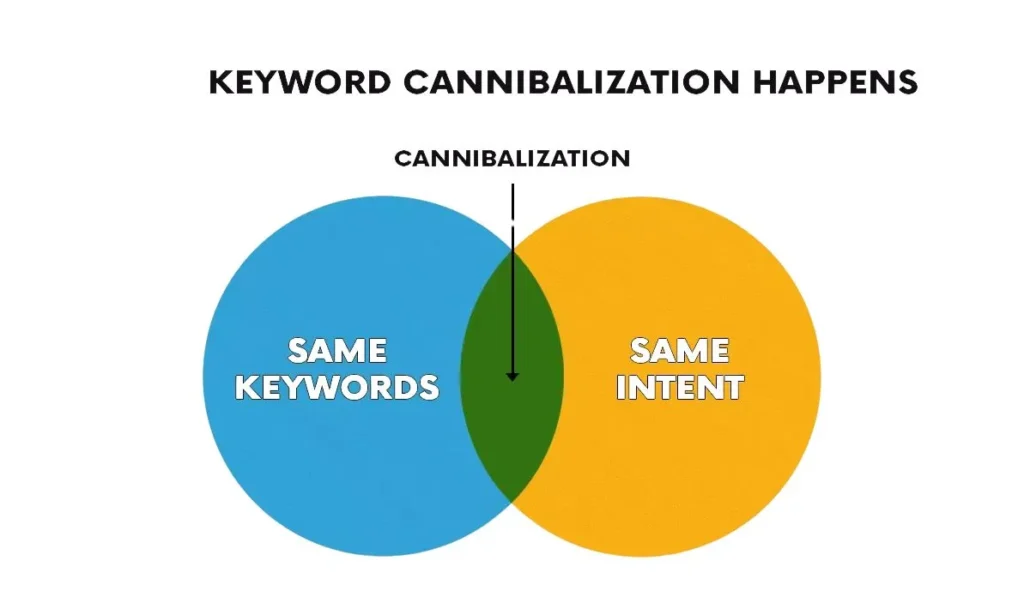
Why is Keyword Cannibalization Bad for SEO?
Keyword cannibalization creates several SEO problems, including:
- Diluted Page Authority: Instead of one strong page, you have multiple weak pages competing.
- Lower CTR (Click-Through Rate): Users get confused when they see multiple similar pages.
- Reduced Search Visibility: Instead of boosting rankings, it splits traffic across pages.
- Wasted Crawl Budget: Search engines waste time crawling unnecessary pages.
- Poor User Experience: Visitors struggle to find the best content.

How Our Agency Boosts Your Website Traffic
- SEO That Brings Long-Term Success
- Transform Your Traffic into Loyal Customers
- SEO Strategies for Sustainable Growth
How to Identify Keyword Cannibalization?
The first step to fix keyword cannibalization is identifying it. Here’s how you can check:
1. Use Google Search Console
Google Search Console is a valuable tool for identifying keyword cannibalization. Navigate to the “Performance” section, and filter by queries to see which pages are ranking for the same keyword. If multiple pages are appearing for the same search term, it’s a sign of cannibalization.
2. Run a Site Search Query
You can manually check for keyword cannibalization by searching:
site:yourwebsite.com “your target keyword”
If multiple pages appear for the same keyword, your site might be affected.
3. Use a Third-Party Tool
Many keyword cannibalization tool options help automate this process. The best tools include:
- SEMrush Cannibalization Checker – Helps find competing pages for the same keywords.
- Ahrefs – Use the “Organic Keywords” report to check keyword overlap.
- Moz Keyword Explorer – Identifies multiple pages ranking for the same keyword.
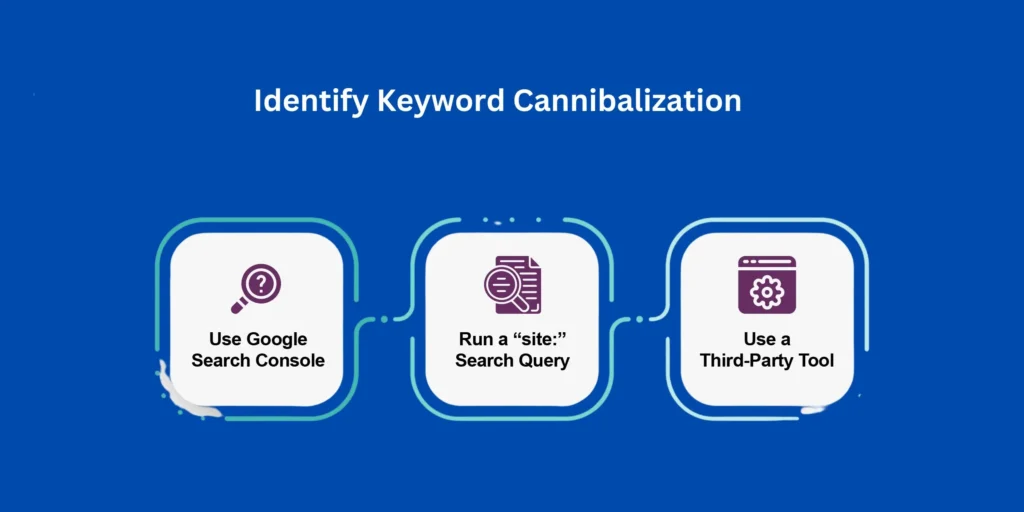
How to Fix Keyword Cannibalization Issues?
Once you’ve identified keyword cannibalism, it’s time to fix it. Here are the best strategies:
1. Restructure the Website
If your website suffers from keyword cannibalization due to poor site structure, consider reorganizing your content. Group similar topics under a single category or hub page to avoid competing for the same keywords.
2. Develop a New Landing Page
If multiple pages are competing for the same keyword, creating a dedicated landing page that serves as the primary authority on the topic can help consolidate rankings and improve user experience.
3. Optimize Internal Linking
Internal linking helps guide search engines and users to the most relevant page. If multiple pages are competing, add internal links directing visitors to the most important page.
4. Add New Keywords
To differentiate pages targeting similar topics, introduce new related keywords to diversify search intent. This helps search engines understand the unique purpose of each page.
5. Implement 301 Redirection
If you have multiple outdated pages that no longer provide value, use a 301 redirect to point them to the most relevant and authoritative page. This helps consolidate ranking signals and avoids competition among similar content.
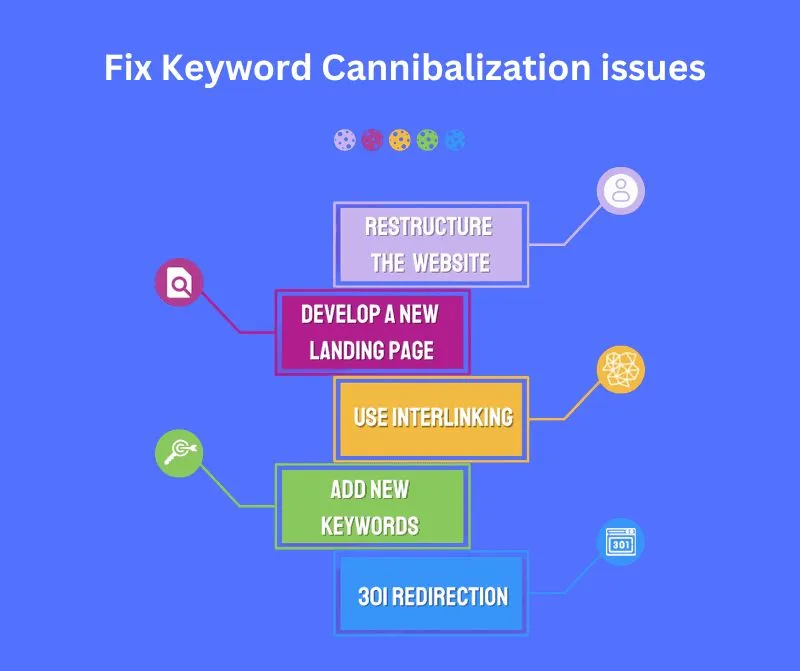
Best Tools to Check and Fix Keyword Cannibalization
Using a keyword cannibalization checker can help speed up the process. Here are some top tools:

SEMrush Cannibalization Checker
- Identifies overlapping keywords
- Suggests merging or redirecting pages
- Improves SEO Efficiency
- Enhances User Experience
- Tracks Keyword Performance
Google Search Console
- Shows which pages rank for similar keywords
- Helps track performance over time
- Sitemaps Submission
- Mobile Usability Reports
- Index Coverage
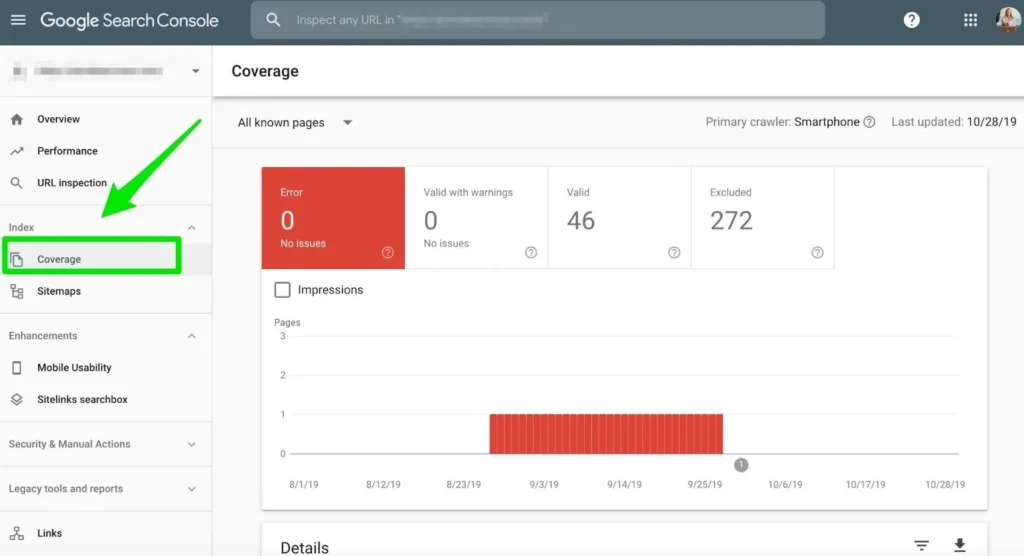
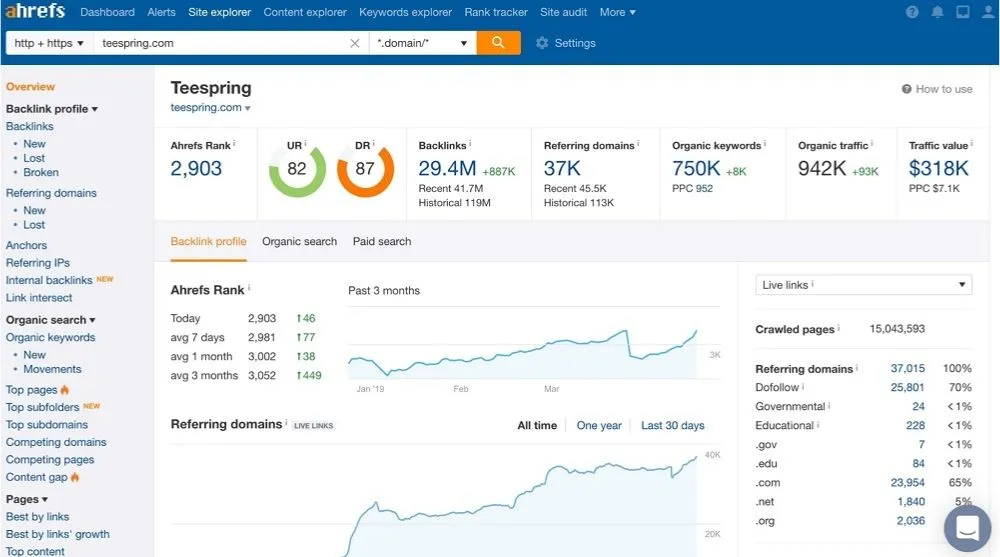
Ahrefs
- Provides keyword ranking reports
- Highlights keyword overlap between pages
- Backlink Analysis
- Competitor Analysis
- Backlink Analysis
Screaming Frog SEO Spider
- Scans site structure to detect similar content
- Redirects and Canonicalization
- Broken Link Detection
- XML Sitemap Generation
- Duplicate Content Checker

Preventing Keyword Cannibalization in the Future
1. Conduct Regular Keyword Audits
- Monitor Overlapping Keywords: Regularly audit your content to ensure you aren’t targeting the same keywords on multiple pages. Use tools like SEMrush or Ahrefs to identify any keyword overlaps.
- Organize Keyword Targeting: Create a clear keyword strategy for each page, mapping out which keywords will be targeted by each piece of content to avoid competition.
2. Use a Keyword Mapping System
- Content Planning: Implement a keyword mapping strategy where each target keyword is assigned to a specific page. This can prevent you from inadvertently targeting the same keyword on different pages.
- Cluster Keywords: Organize keywords into clusters or themes so that each group has one primary page optimized for that cluster, ensuring content does not overlap.
3. Optimize Existing Content
- Merge and Update Content: If you find pages targeting the same keyword, consider merging the content and updating it to create a more comprehensive resource.
- Use Canonical Tags: If you need to keep similar pages for various reasons, use the
rel="canonical"tag to indicate the preferred version of the page to search engines, preventing them from indexing multiple versions.
4. Focus on Content Intent
- Match Search Intent: Ensure that each page targets a distinct search intent. This helps to avoid creating content that is too similar and thus reduces the chance of cannibalization.
- Content Differentiation: If you have similar topics, differentiate them by focusing on subtopics or addressing different aspects of a broader subject.
5. Leverage Internal Linking
- Strategic Internal Links: Use internal linking to point to the most relevant page for a given keyword, helping to consolidate link equity and clarify to search engines which page should rank for the target keyword.
- Avoid Cross-linking Cannibalized Pages: Avoid linking between pages that target the same keyword to prevent reinforcing keyword cannibalization.

How Our Agency Boosts Your Website Traffic
- SEO That Brings Long-Term Success
- Transform Your Traffic into Loyal Customers
- SEO Strategies for Sustainable Growth
Conclusion
Keyword cannibalization is a silent SEO killer. If left unchecked, it can prevent your site from ranking properly, waste your crawl budget, and hurt your search engine rankings. To fix this issue, businesses must take proactive steps such as merging similar content, using proper keyword mapping, implementing canonical tags, and optimizing internal linking. Utilizing keyword cannibalization checker tools such as Google Search Console, Ahrefs, or SEMrush can help identify and resolve the issue more efficiently. By addressing this problem, you can enhance your website’s visibility, drive organic traffic, and improve user experience, ultimately leading to better search engine performance. Start auditing your content today and optimize your rankings effectively!
FAQs
What is keyword cannibalization in SEO?
Keyword cannibalization happens when multiple pages from the same website target the same keyword or search phrase. As a result, these pages compete against each other in search engine rankings, diluting the authority and effectiveness of each page. This leads to reduced visibility, lower rankings, and wasted SEO potential.
How do I identify keyword cannibalization?
You can identify keyword cannibalization by using tools like Google Search Console, SEMrush, or Ahrefs. By reviewing which pages are ranking for the same keywords or performing a site search with your target keyword, you can detect overlapping content. If multiple pages are ranking for the same term, that’s a sign of cannibalization.
Can keyword cannibalization negatively affect my SEO performance?
Yes, keyword cannibalization can have several negative effects on your SEO. It can dilute the authority of individual pages, lower your click-through rates (CTR), reduce search visibility, and waste your crawl budget. This means search engines might not prioritize the right page, and your content might not get the rankings it deserves.
How can I fix keyword cannibalization issues?
To fix keyword cannibalization, consider consolidating similar content into a single authoritative page. You can also implement 301 redirects to guide traffic to the most relevant page, optimize internal linking to prioritize key pages, and add new keywords to differentiate content. Merging pages or using canonical tags can also help resolve duplication issues.
How can I prevent keyword cannibalization in the future?
Prevent keyword cannibalization by creating a comprehensive keyword strategy that maps specific keywords to individual pages. Regularly audit your content to check for overlaps and use a keyword mapping system to organize your content. Additionally, focus on unique search intents, strategically use internal linking, and avoid targeting the same keyword on multiple pages.









